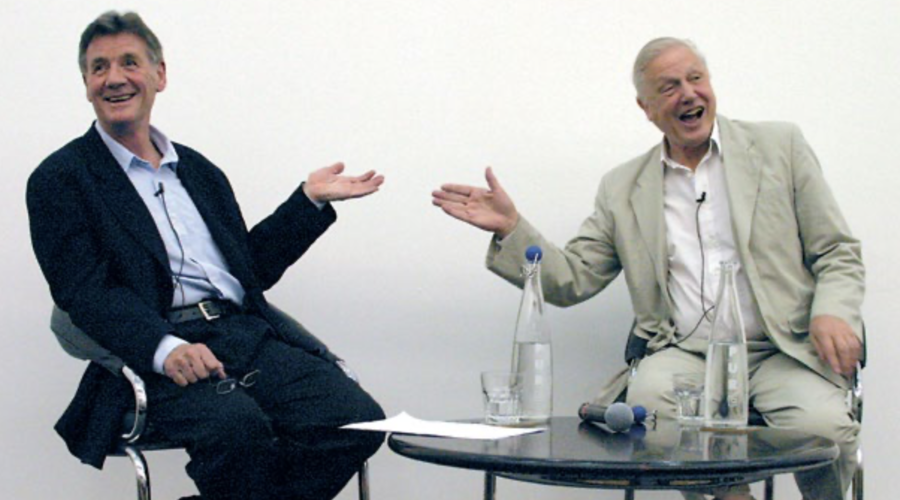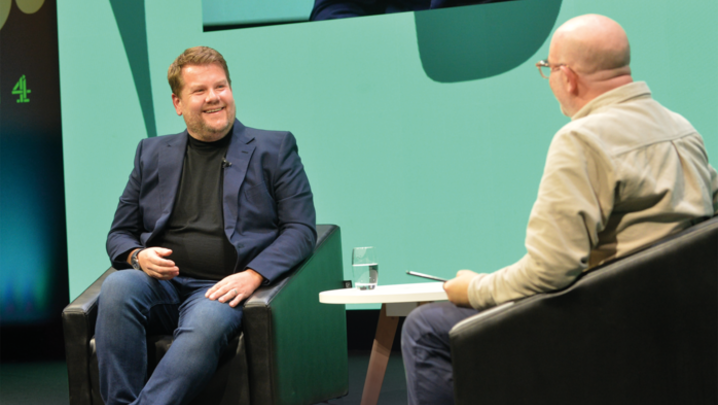Steve Clarke watches Michael Palin quiz fellow globetrotter Sir David Attenborough on the highs and lows of half a century of broadcasting.
Fifty years ago, the BBC almost made a big mistake – one that would have changed the course of broadcasting history. After trying out a new recruit, head of television talks Mary Adams decided that her discovery had much to recommend him but, frankly, lacked the bland good looks considered necessary for the presenter’s art.
“David Attenborough is intelligent and promising and may well be producer material, but he is not to be used again as an interviewer. His teeth are too big,” ordered Adams.
Wisely, perhaps, Michael Palin, another born communicator, chose not to mention Adams’s opinion of the youthful Attenborough at what was, by any reckoning, an extraordinarily entertaining RTS early evening event as the younger man guided the doyen of natural history television through a career that shows no signs of flagging after 52 years.
“This is more a chat than an interview,” announced the Monty Python star turned television traveller as the two men took their seats to red-hot applause.
As any chatshow producer knows, Attenborough is a king among raconteurs. Ask him anything, however banal, and the answer will still be worth listening to.
Put him alongside another natural entertainer like Palin and even Jon-a-than Ross might struggle to compete.
Palin’s slightly shambolic bonhomie, gentle debunking and Sir David’s effortless charm, lined with English self-effacement, made this, as MC Sue Robertson said, “a magical evening”.
Actors – and more later about Sir David’s thespian streak – are experts at concealing themselves but when, towards the end of proceedings, Palin confessed that he envied the way that Attenborough had planned his professional life you felt that he’d left his mask in the dressing room.
“I’ve been slightly more instinctive,” said Palin referring to his own zigzagging career. “I’ve done a lot of different things, a bit of comedy, a bit of acting and now travelling… I waffle a lot, a bit like now.”
But how do you interview a man who has been interviewed almost as many times as Tony Blair and is a National Icon to boot – the only bona fide BBC name to be voted on to the list of Great Britons by BBC2 audiences.
Palin found his inspiration in a copy of the Cambridge Biographical Dictionary – noting that Sir David’s entry is listed between that of Charles Atlas, the American muscleman, and his own brother, Richard, film-maker, actor and one-time chairman of Channel 4.
It was an oblique, if deceptively clever, device to engage the audience. Palin’s guest expertly recounted the story of how, filming in the Pacific, having successfully navigated the surf at Makaruka in the Solomon Islands, he was asked by the locals to strip naked and dress himself in a narrow loin cloth. At a stroke, we had entered Attenboroughland.
“It was very wet and hugs you very tightly – not only that, it contracts as it dries,” Attenborough remembered of his Charles Atlas-like exploits.
The presenter’s role
The anecdote told, Palin put a serious question; he’d always thought that Sir David was a better actor than his brother – true or false? Most actors would find themselves out of their depth faced by a female mountain gorilla intent on exploring the inside of their mouths, Palin mused, but it’s all in a day’s work for the great programme maker
“The sort of pieces that I have to do to camera have a very precise function,” he said. “We outline the programme in great detail so I know the structure. And I know why it is that we are expecting viewers to look at me instead of looking at an animal.
“My appearance as a presenter may have to explain I have moved to a different continent – or am now moving to a different section of the animal kingdom. You have to do that very succinctly. You mustn’t blather. If I was good enough, I ought to be able to do my bits again and again and again, but that is not the way you do it.”
The two small-screen globetrotters had first met in the late 1960s. Alongside Cleese, Chapman, Idle, Gillian and Jones, Palin was rewriting comedy history as part of Monty Python’s Flying Circus. A book has been published about how certain BBC executives wanted to tone down Python because they regarded the material as being too risqué.
But Attenborough, by then BBC Television’s director of programmes and having successfully relaunched the fledgling BBC2 in the preceding years, took a somewhat different view. “These chaps [are] pretending to be naïve chaps straight down from university,” he said. “On the contrary, they spread a rumour in the press that this was the show that BBC high-ups were desperately trying to suppress, forgetting that we’d actually commissioned it in the first place.”
Palin demurred: “I don’t think any other broadcasting organisation in the world would have given Python a chance then. But we did feel very put upon at the time because we were given this late-night Sunday slot and continually taken off to make way for things like Farming Today or The Horse of the Year Show. Actually, they couldn’t tell the difference.”
He added: “You [David] didn’t attempt to justify what the BBC had done in taking us off and putting us on at different times. You said it’s the best way to create a cult and make the programme more popular than it deserves to be. Actually, I don’t think you used the word ‘deserves’. I thought that was commendably honest. You were quite right.”
Back to the bat cave
Sir David, of course, left his desk on the sixth floor at Television Centre in 1972 to return – as Palin put it – “to wading around in bat dung”, a pursuit that continues to delight viewers in their millions.
Palin asked if it was more difficult taking the decision to give up making natural history programmes in the first place (he had stopped doing Zoo Quest in 1965) or taking leave of the corridors of power?
“They were both pretty easy [decisions]. I’d been doing Zoo Quest since 1954. To my total surprise Huw Wheldon [then controller of programmes] rang me and invited me to do BBC2. Michael Peacock [the channel’s first controller] had got it on air but the pro-grammes weren’t as they should be.
“For me, it was an ideal situation. It couldn’t get worse than it was. I was inheriting a channel still to find its way. Whatever you did it was going to go up.”
Upwards BBC2 did indeed go. “There were great directors and great people just raring to go,” Attenborough recalled. “To be able to go there and do a programme on the origins of art or commission an opera from Benjamin Britten or to invent one-day cricket. “Can you imagine how thrilling it was? It was just lovely. I can’t tell you. I did that for four years and had a great time.”
The BBC, red in tooth and claw
The next rung up on the greasy pole was less to Sir David’s liking. “Being director of programmes means you get to do all the boring bits – the finance and the trade unions. In theory I was in charge of BBC1 and 2, but in reality it meant looking after all the problems. After four years it became absolutely clear to me that the place to be was in Borneo and not there.”
Nonetheless, Palin wondered, could he have been in line for the director-general’s job? “No, absolutely not.”
The BBC’s loss was the audience’s gain as the “sledgehammer series”, written and presented by Attenborough, began to emerge: Life on Earth, The Living Planet, Trials of Life, The Blue Planet and more recently The Life of Mammals, An Epic Tale of Survival, an appropriate description for an extraordinary career.
The latest, Life in the Undergrowth, looking at insects and other small creatures, has again involved Attenborough making new and exciting discoveries about the natural world.
“As you make these programmes,” he said, “scientific knowledge develops all the time. We were out in Kentucky filming a marvellous spider that throws out a sticky lasso at passing moths.
“The director came up to me and said, ‘You know that stuff you wrote about the millipedes for programme 1 and their curious sexual habits?’ Yes, I know all about that.
“‘Well, I’ve just learnt a fantastic thing – there’s a place in Brazil where there is a centipede that is 14 inches long and leaps into the air and catches bats.’
“This fact is unpublished. I shouldn’t be telling you this now. And we’re going to have the first shot of it.”
Sir David Attenborough in conversation with Michael Palin was an RTS early evening event held in London on 21 September.
Attenborough’s heart skips a beat
“As a small boy I read books by Alfred Russell Wallace about going to New Guinea and seeing birds of paradise.
“On a number of occasions we’ve tried to film them. On our last trip we did find the display ground of a very rare bird of paradise in central New Guinea.
“We built two hides – one for the cameraman and one for me – where we positioned ourselves two hours before the sun came up and waited for the bird.
“The bird arrived and performed this astounding dance, throwing up its feathers in explosions of colour and then flew away.
“As I returned to our camp I shouted to the crew, ‘We’ve got it’. Dickie Bird, the cameraman, said: ‘I knew you’d got it. I knew the moment you got it because you had the radio mike on and I could hear your heart rate double in pace.’
“That’s what one tries to get from the film. Sitting in front of your television your heart does go a bit faster.”
Attenborough on sex
Michael Palin: “It’s a slightly frivolous question, but I’ve always envied you your ability to show sex on your programmes. With Python, we were only allowed the odd bottom, but you have hours of copulation. Is there anything you’ve ever had to cut because it was too frank for the audience?”
David Attenborough: “In the new series we do have a sequence showing slugs copulating on a rope of mucous.”
Michael Palin: “You are happiest in the natural world, but would you want to do a programme about human activity?”
David Attenborough: “It’s a very interesting and serious question. But you can’t do a programme about human behaviour without thinking about sexual behaviour and the only way to film that is to do it when people are unaware. Otherwise it would be invalid. There’s no way you can do that. That’s why it’s fundamentally different to making natural history films. Natural history films work best when the animals don’t know you are there.”
David Attenborough: “If you look at a lion in the eyes they are cold, feline eyes and you have no idea what’s going on at the back of their skull. But when you look at a gorilla and exchange a glance you’ve got an extraordinary feeling of empathy. You don’t know fully what is going on but it’s not so different from you.”






